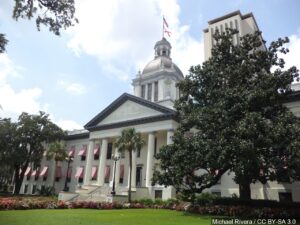
The Florida Senate has been making progress with Senate Bill 264, which addresses higher educationand is heavily dependent on federal funding to complete its duties.
After being filed on Dec. 14, the bill is now with the AppropriationsCommittee where it is waiting on decisions made by Congress about how the federal government spends some of its monies. According to the Committee for a Responsible Federal Budget, the appropriations process addresses the discretionary portion of the budget — spending ranging from national defense to food safety to education to federal employee salaries — but excludes mandatory spending, such as Medicare and Social Security, which is spent automatically according to formulas.
The higher education bill, introduced by Republican Senator Ray Wesley Rodrigues, requires the state Board of Education to mandate each public college and university in Florida to conduct an annual assessment related to intellectual freedom and viewpoint diversity. “Intellectual freedom and viewpoint diversity” refers to the exposure of students to a variety of ideological and political perspectives.
The bill will also require the state Board of Education to annually publish such assessments by a specified date, prohibiting the state Board of Education from shielding Florida students from certain speech. To “shield” in this instance means to limit students access to or observation of ideas and opinions they may find uncomfortable, unwelcome, disagreeable or offensive.
SB 264 gives the right to expressive free-speech activities. According to the Florida Senate website, this expressive speech is not limited to, any lawful oral or written communication of ideas, including all forms of peaceful assembly, protests and speeches; distributing literature; carrying signs; circulating petitions, etc.
The proposed legislation may clash with Florida statue 934.03(1), which says the recording and publication, including the Internet publication of video or audio recorded in outdoor areas of campus and in classrooms, subject to the protections provided in the Family Educational Rights and Privacy Act.
This legislation comes after a series of political demonstrations around the country this past year. From peaceful demonstrations supporting the Black Lives Matter movement to the unpatriotic insurrection at the nation’s Capitol, this legislation would allow those in higher education to legally discuss these matters in depth despite the feelings it may incite.
Senator Rodrigues has introduced 23 bills since the beginning of the year and has co-introduced five bills. Many of them involve education as well as children and families.